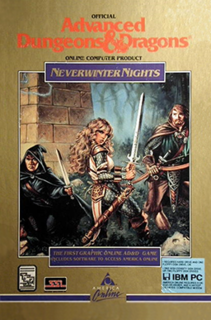Baldur's Gate II it ain't...
Of course, that was a lie. At some point, the developers decided to fully switch to D&D 3.0. That was not entirely surprising, though, since Baldur's Gate II already incorporated, despite being a AD&D 2ed game, the new 3.0 classes (monk, barbarian and sorcerer) and race (half-orc). But I digress...
When I got this game, I was expecting it to be similar in spirit and content to the absolutely brilliant Baldur's Gate II. Character creation was good, and it got my hopes up. There were a lot of feats and skills to choose from (something AD&D 2ed lacked), but after I started to play the game, I noticed several issues I didn't like. The first one (and for me, the most important) was the absolute lack of a party. You can only have ONE henchmen at any given time, and to add insult to injury you have limited control over him; you can't browse his inventory and can't fully control his actions. To me, who's used to the six person party of the Baldur's Gate series and the full control you had over all your characters, this was nothing short of unforgivable. In more practical terms, this means you should almost always multiclass, because you don't have the support of a full party behind you . It also means, more often than not, that you should take fighting classes (ranger, paladin, fighter or barbarian) for the first levels of your character, or else your chances of survival will be reduced drastically. The game is battle-heavy, and you start with a level one character. You level up at the tutorial, so for practical purposes you start the "real" game with a level two character. Since at the first act of the game you find enemies around almost every corner, if you have a character with low combat capabilities and/or low HP (read: mage, sorcerer and, to a lesser extend, rogue), you have to rely on spells and ranged weapons, which in turn also means that when your enemies try to move closer to you for a melee attack, your basic strategy is to run away from battle lest you want to die. Even with a fighter, paladin or ranger, you have to run away sometimes when you're against a strong enemy (or against a group of moderately competent ones). You have to rest a lot too, since healing potions and first aid kits, while not scarce, aren't exactly abundant either; and you also need to rememorize/replenish your spells if you're a magic user. After a while, the whole process of attacking, running away, resting and going back to start again gets really repetitive and tedious.
If you die, you can choose to respawn (it costs some gold). You also have a "teleport stone" that creates a portal to the current act's base of operations; so when you're low of health you can, for example, teleport back to the temple, rest, pay to the priest (or whoever is in charge of the teleporter) there to get back to your original location and return to the action. This, while not necessarily a bad thing, feels awfully like Diablo and cheapens the whole RPG experience. The combat-heaviness of the game also means character interaction between you and your henchman and/or other NPCs takes a backseat to the action. Again, this is not necessarily a bad thing, but I would have preferred a more balanced approach between action and character interaction.
The radial interface you use to interact with the environment is good, clean and easy to learn, no complains there. The inventory instead of being a simple "one slot per item" one is a gridded one, in which each item takes one or more spaces depending on size. Fortunately, there's an "auto arrange" option and the size of your inventory is fairly large (you have several "pages") so you don't have to painfully try to make room for that new item you just found or acquired. Graphics are good, if not spectacular. Sure, you can rotate the camera and select between several views, but the environments are somewhat repetitive (specially at urban areas) and all the characters look somewhat funny. I very much prefer Baldur's Gate II art, despite the graphics being 2D and sprite-based. 3D doesn't always mean better. Sound is kinda forgetable, however I have no real complaints about it. I guess for me sound isn't really that important. The story almost feels as an excuse for playing, which for me it's a testimony of how the RPG elements of the game were de-emphasized in favor of the action ones. In the end, I found myself pretty disappointed with the game. Still, when I managed to stop comparing this game to Baldur's Gate I started to enjoy it, specially after I leveled up a bit and stopped dying a myriad deaths. The game does improve a lot with the expansion packs, which among other things add several prestige classes, raise your max level over 20, add another slot for an extra henchmen (so you can have two instead of one - that's almost a party!) and let you have more control over them. I can't comment on the multiplayer/module creation aspects of the game since I'm mostly a single player gamer, but I've heard it's one of its strong points, so if you're into multiplaying they might be worth a try.

